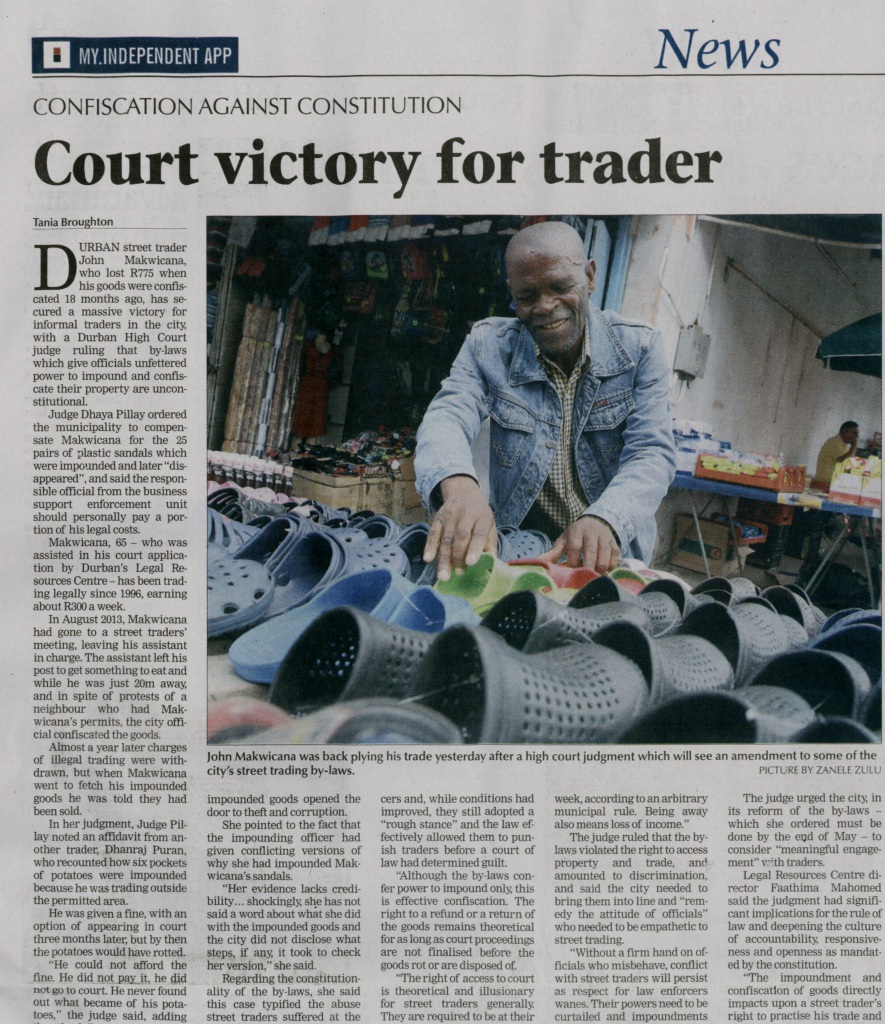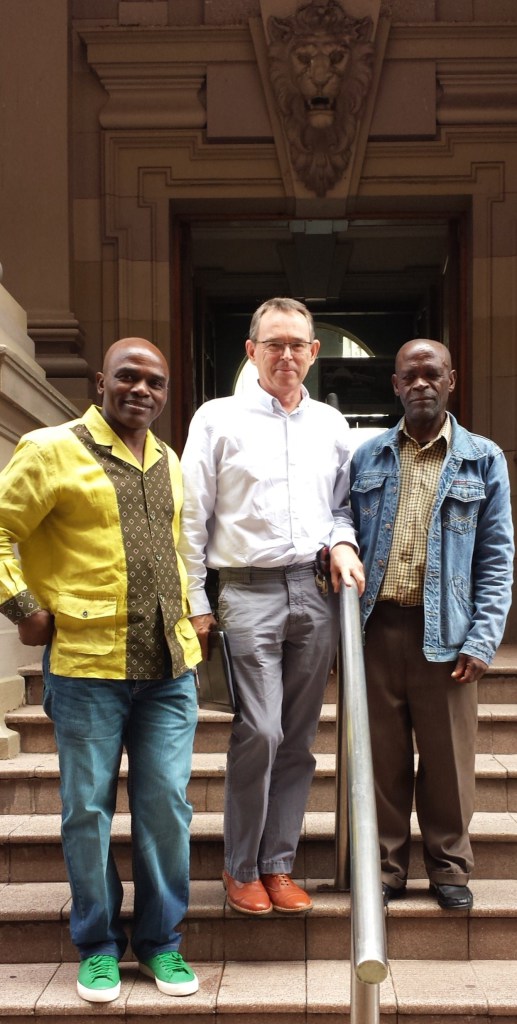Richard Dobson & Tasmi Quazi
In the course of Asiye eTafuleni (AeT) implementing its project based work, we have been conscious of the hardships that confiscations and other punitive actions by enforcement officials place on informal workers. One such event that emerged was the case of John Makwicana, a legally compliant trader in all aspects of the municipal bylaws, who had his goods summarily confiscated. In the normal course of events, traders are forced to acquiesce to the municipality’s process after their goods are confiscated, which is to pay the fines and subsequently their goods may be returned.
John believed that he was not guilty of an offense and was therefore not willing to expediently pay the fine. When AeT became aware of his particular circumstance and that the matter required legal assistance, we introduced the case to the Legal Resources Centre (LRC) – a public interest, human rights law body.
John’s protracted case began in August 2013 when his goods were confiscated by a Police Officer. The case was then heard in the High Court in October 2014, which in itself was a significant milestone for informal workers. At the hearing, the matter was argued for three and a half hours which underscores the gravity of the case.
During this time, John was particularly enthused when the Judge considered the responses by the City’s legal counsel to be inadequate to her questions of what laws justified the confiscation of John’s goods, and what the police did with the goods after confiscating them. John added:
“We as informal trader leaders have been trying to discourage police officers from impounding traders’ goods, but to no avail. It is my hope that this case is successful and results in less abuse of power and corruption by police officials and finally brings some relief for us traders. The bylaws permitting confiscations of traders’ goods need to be struck out.”
In light of John’s wish above following the hearing in October 2014, the judgement recently handed down has been significant for various reasons and affirms his statement. Firstly, the judgement declared that the confiscation of his goods was unlawful. In addition, the court awarded John compensation for the value of his impounded goods including interest. This monetary award is seldom made by the Court as a recourse and is recognition of the injustice of punitive actions like confiscations which inordinately burden informal workers.

- This Mercury newspaper article covering the Court victory and written by Tania Broughton can be read here.
Secondly, Section 35 dealing with the impoundment of goods and Section 39 dealing with liability (of municipal officials) of the municipal bylaws were declared “unconstitutional, invalid and unlawful”. John’s case was premised on challenging the constitutionality of confiscations and this outcome has been achieved. The judgement suspended these clauses pending the reform of the bylaws by the municipality. In the full judgment, the Judge expressed the hope that the municipality would engage in a consultative process to reformulate these clauses. This again is considerably progressive.
Thirdly, the City and the police official were ordered to jointly and severally pay the cost of the trader’s legal challenge. It is yet to be seen whether the municipality apportions some of these costs to the police official considering that the Judge was severely critical of her behaviour and the scant evidence that she presented to the court.
Upon reading the full judgement, it is evident that the Judge had sympathetically understood the hardships faced by informal workers and the impact of the summary deprivation of their goods experienced through confiscations. The case law clearly documents the vulnerability of informal workers and the need for sympathetic municipal administration and enforcement. For example, the Judge said:
“To deprive street traders of their property permanently, s 35 of the By-law has to overcome additional hurdles of fair procedure, rationality and proportionality to be valid. In the context of street traders procedural fairness would require notification to the owners that they are accused of a breach of the By-law before their goods are impounded and disposed of. As shown in the discussion on s 34 of the Constitution above, s 35 of the By-law does not impose any obligation upon the police to give any notice. None of the respondents pointed to any measures in place to afford street traders a hearing other than litigation after the property is impounded and usually after it is disposed of (…)
(…) Deprivation of their property is so invasive of their property rights that it impacts on the welfare of the street traders and their large families. For most the impounded goods are their only assets and means to a meal. Impoundment is therefore serious irrespective of the commercial value of the goods. Deprivation also impacts on their identity and dignity as people with property, however little that is. On the facts of this case the deprivation was permanent, without notice and without compensation …”
Lastly, John’s ability to prioritise the case and take a personal risk is admirable considering that most informal workers cannot afford the time or the financial risk to launch a legal challenge against a formidable adversary like the municipality. In addition to his willingness to challenge the injustice; the availability of AeT, LRC and their expert witness, researcher Caroline Skinner, all proved key to securing access to the legal process.

Consequently, this is a landmark judgement which will help to protect the rights of informal workers nationally and in other international contexts. This is particularly prescient given the recent spate of enforcement-driven approaches to managing informal traders in other metropolitan centres in South Africa, and an approach that is rampant in other international contexts.
To read LRC’s official press release, click here. The full judgment of the High Court can be accessed here.



